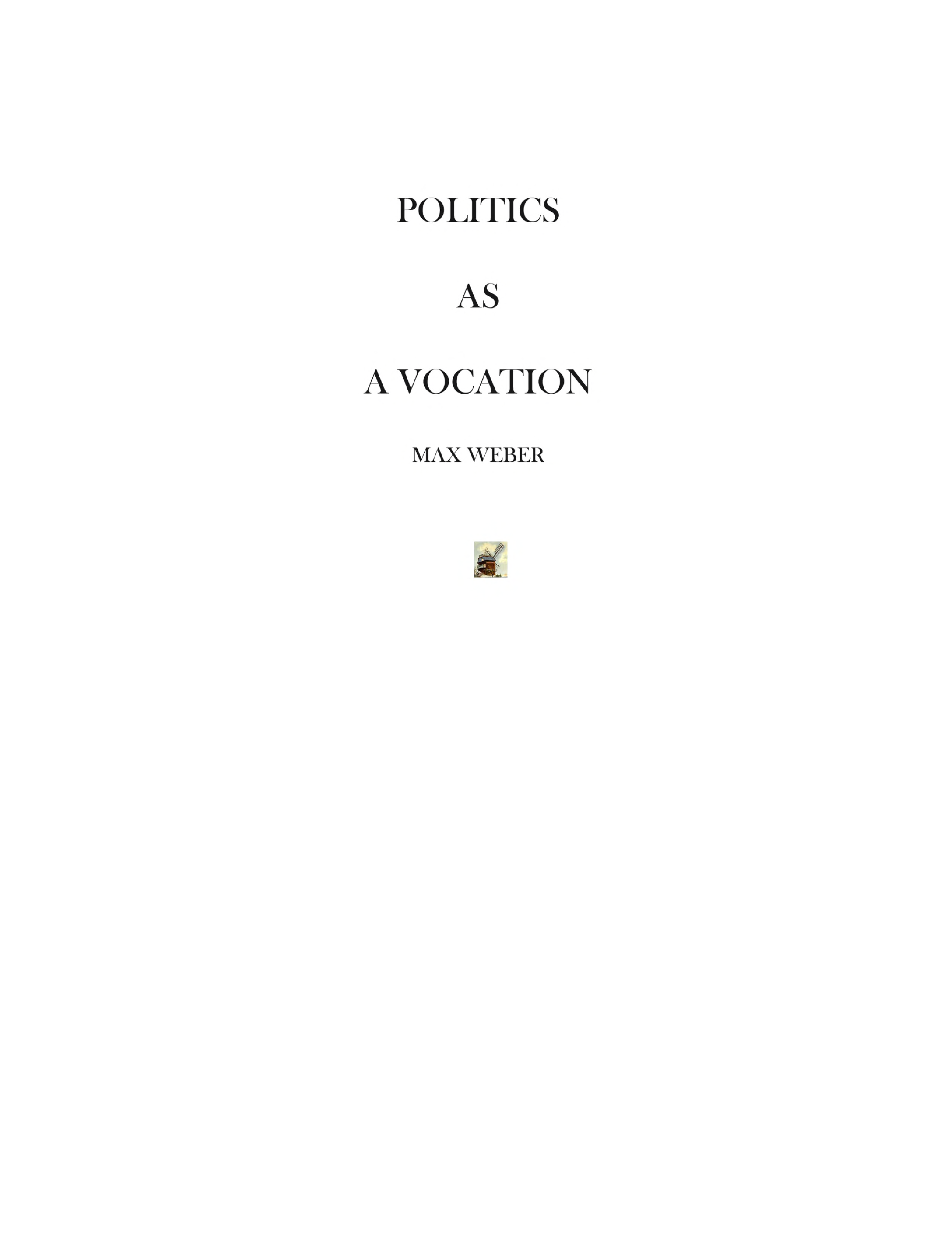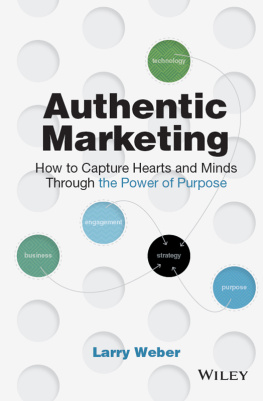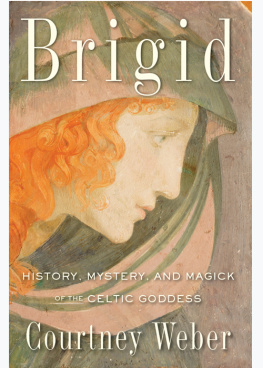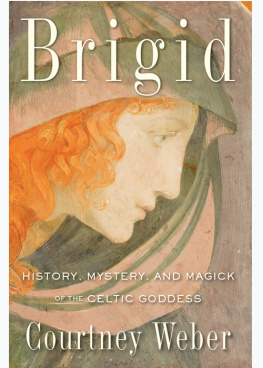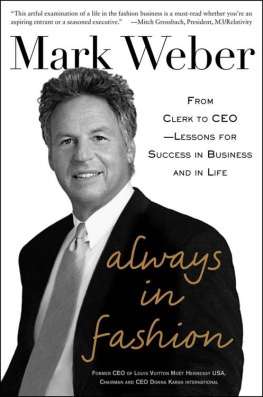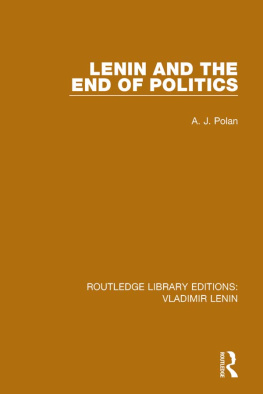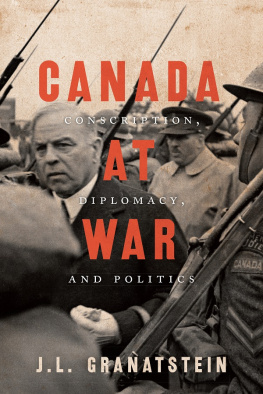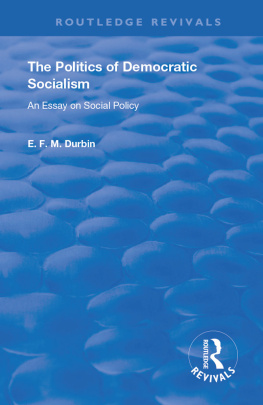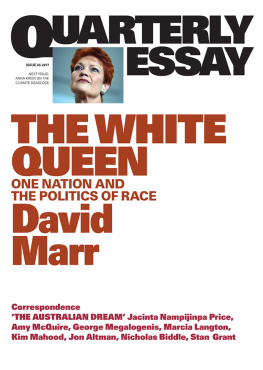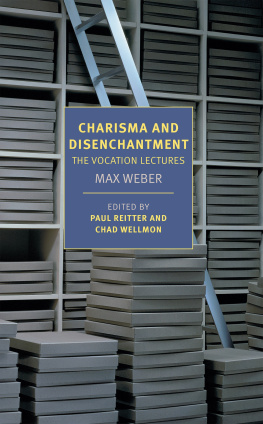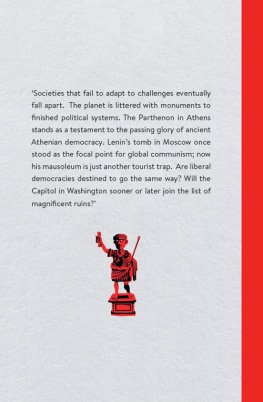Weber - Politics As a Vocation
Here you can read online Weber - Politics As a Vocation full text of the book (entire story) in english for free. Download pdf and epub, get meaning, cover and reviews about this ebook. year: 1946, publisher: Oxford University Press, New York, genre: Politics. Description of the work, (preface) as well as reviews are available. Best literature library LitArk.com created for fans of good reading and offers a wide selection of genres:
Romance novel
Science fiction
Adventure
Detective
Science
History
Home and family
Prose
Art
Politics
Computer
Non-fiction
Religion
Business
Children
Humor
Choose a favorite category and find really read worthwhile books. Enjoy immersion in the world of imagination, feel the emotions of the characters or learn something new for yourself, make an fascinating discovery.
Politics As a Vocation: summary, description and annotation
We offer to read an annotation, description, summary or preface (depends on what the author of the book "Politics As a Vocation" wrote himself). If you haven't found the necessary information about the book — write in the comments, we will try to find it.
Politics As a Vocation — read online for free the complete book (whole text) full work
Below is the text of the book, divided by pages. System saving the place of the last page read, allows you to conveniently read the book "Politics As a Vocation" online for free, without having to search again every time where you left off. Put a bookmark, and you can go to the page where you finished reading at any time.
Font size:
Interval:
Bookmark:
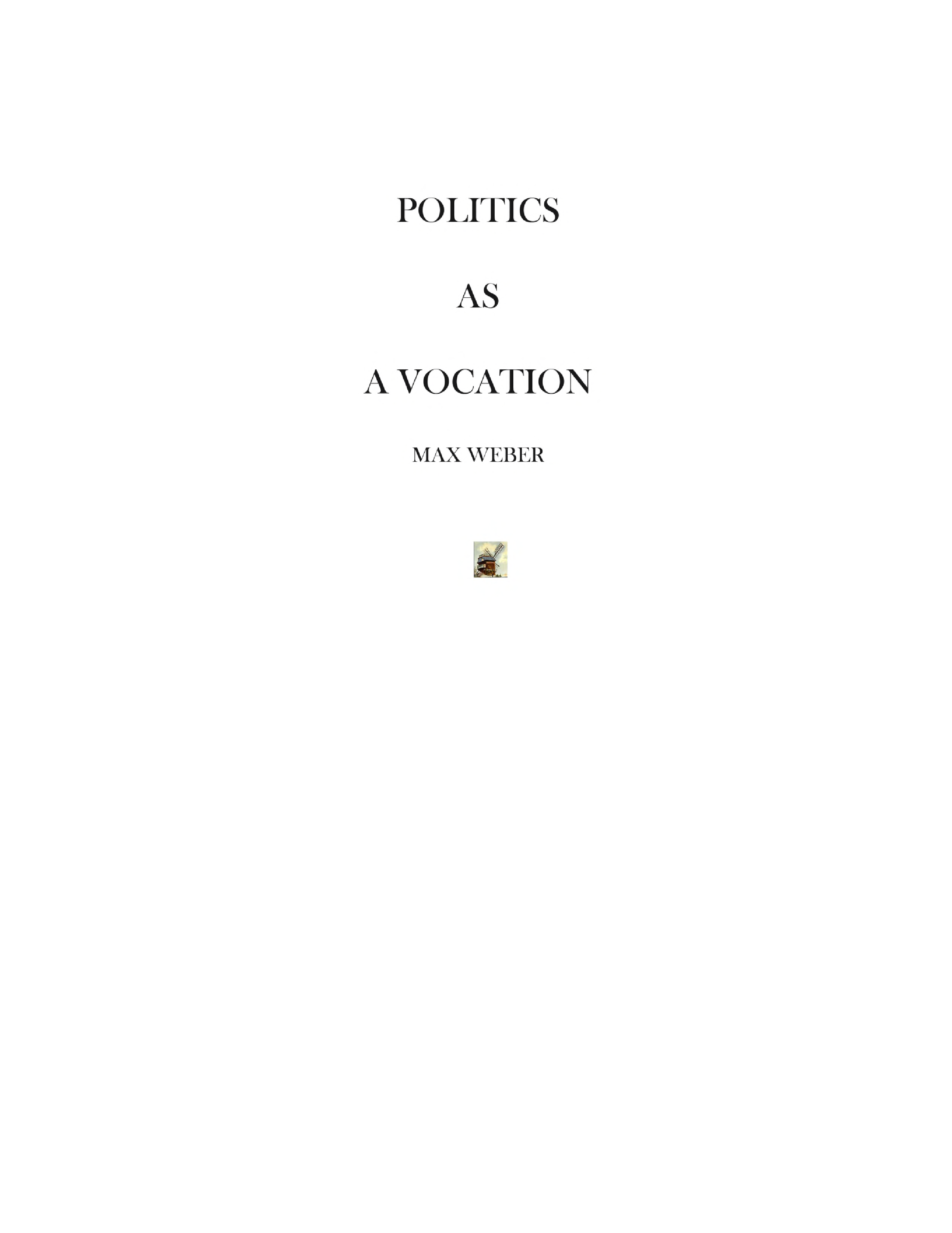
Weber, Max, 1864-1920
This book was produced in EPUB format by the Internet Archive.
The book pages were scanned and converted to EPUB format automatically. This process relies on optical character recognition, and is somewhat susceptible to errors. The book may not offer the correct reading sequence, and there may be weird characters, non-words, and incorrect guesses at structure. Some page numbers and headers or footers may remain from the scanned page. The process which identifies images might have found stray marks on the page which are not actually images from the book. The hidden page numbering which may be available to your ereader corresponds to the numbered pages in the print edition, but is not an exact match; page numbers will increment at the same rate as the corresponding print edition, but we may have started numbering before the print book's visible page numbers. The Internet Archive is working to improve the scanning process and resulting books, but in the meantime, we hope that this book will be useful to you.
The Internet Archive was founded in 1996 to build an Internet library and to promote universal access to all knowledge. The Archive's purposes include offering permanent access for researchers, historians, scholars, people with disabilities, and the general public to historical collections that exist in digital format. The Internet Archive includes texts, audio, moving images, and software as well as archived web pages, and provides specialized services for information access for the blind and other persons with disabilities.
Created with abbyy2epub (v.1.6.1)
POLITICS AS A VOCATION
BY
MAX WEBER
REPRINTED FROM MAX WEBER: ESSAYS IN SOCIOLOGYTRANSLATED, EDITED, AND WITH AN INTRODUCTION BYH. H. GERTH and C. WRIGHT MILLS
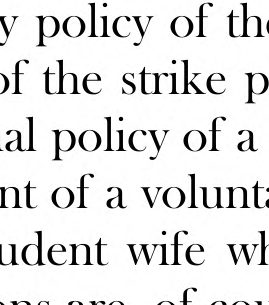
NEW YORKOXFORD UNIVERSITY PRESS
1946
inoulin digital editions
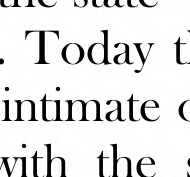
2014
Politics as a Vocation
('Politik als Beruf,' Gesammelte Politische Schriften (Miinchen, 1921),pp. c396-4>50. Originally a speech at Munich University, 1918, publishedin 1919 by Duncker & Humblot, Munich.)
THIS lecture, which I give at your request, will necessarily disap-point you in a numher of ways. You will naturally expect me to takea position on actual prohlems of tire day. But that will be the caseonly in a purely formal way and toward tire end, when I shall raisecertain questions concerning tire significance of political action inthe whole way of life. In today's lecture, all questions that refer towhat policy and what content one should give one's political activitymust be eliminated. For such questions have nothing to do with thegeneral question of what politics as a vocation means and what it canmean. Now to our subject matter.
What do we understand by politics? The concept is extremelybroad and comprises airy kind of independent leadership in action.One speaks of tire currency policy of tire banks, of tire discountingpolicy of tire Reichsbank, of tire strike policy of a trade union; onemay speak of tire educational policy of a municipality or a township,of tire policy of tire president of a voluntary association, and, finally,even of tire policy of a prudent wife who seeks to guide her hus-band. Tonight, our reflections are, of course, not based upon such abroad concept. We wish to understand by politics only tire leader-ship, or tire influencing of tire leadership, of a political association,hence today, of a state.
But what is a 'political' association from tire sociological point ofview? What is a 'state'? Sociologically, the state cannot be defined interms of its ends. There is scarcely any task that some political asso-ciation has not taken in hand, and there is no task that one could sayhas always been exclusive and peculiar to those associations whichare designated as political ones: today tire state, or historically, thoseassociations which have been tire predecessors of tire modern state.Ultimately, one can define tire modern state sociologically only interms of tire specific means peculiar to it, as to every political associ-ation, namely, the use of physical force.
'Every state is founded on force,' said Trotsky at Brest-Litovsk.That is indeed right. If no social institutions existed which knew tireuse of violence, then tire concept of 'state' would be eliminated, anda condition would emerge that could be designated as 'anarchy,' inthe specific sense of this word. Of course, force is certainly not thenormal or tire only means of tire statenobody says thatbut force isa means specific to tire state. Today tire relation between tire stateand violence is an especially intimate one. In the past, the most va-ried institutionsbeginning with tire sibhave known the use ofphysical force as quite normal. Today, however, we have to say that
a state is a human community that (successfully) claims the monopo-ly of the legitimate use of physical force within a given territory.Note that 'territory' is one of the characteristics of the state. Specifi-cally, at the present time, the right to use physical force is ascrihed toother institutions or to individuals only to the extent to which thestate permits it. The state is considered the sole source of the 'right'to use violence. Hence, 'politics' for us means striving to share pow-er or striving to influence the distribution of power, either amongstates or among groups within a state.
This corresponds essentially to ordinary usage. When a questionis said to be a 'political' question, when a cabinet minister or an offi-cial is said to he a 'political' official, or when a decision is said to he'politically' determined, what is always meant is that interests in thedistribution, maintenance, or transfer of power are decisive for ans-wering die questions and determining the decision or the official'ssphere of activity. He who is active in politics strives for power eitheras a means in serving other aims, ideal or egoistic, or as 'power forpower's sake,' that is, in order to enjoy the prestige-feeling that pow-er gives.
Like the political institutions historically preceding it, the state isa relation of men dominating men, a relation supported by means oflegitimate (i.e. considered to be legitimate) violence. If the state is toexist, die dominated must obey die authority claimed by die powersthat be. When and why do men obey? Upon what inner justifica-tions and upon what external means does this domination rest?
To begin with, in principle, there are three inner justifications,hence basic legitimations of domination.
First, die authority of die 'eternal yesterday,' i.e. of the moressanctified through die unimaginably ancient recognition and habitualorientation to conform. This is 'traditional' domination exercised bythe patriarch and die patrimonial prince of yore.
There is die authority of tire extraordinary and personal gift ofgrace (charisma), the absolutely personal devotion and personal con-fidence in revelation, heroism, or other qualities of individual lea-dership. This is 'charismatic' domination, as exercised by tireprophet orin tire field of politicsby tire elected war lord, tire ple-biscitarian ruler, tire great demagogue, or tire political party leader.
Finally, there is domination by virtue of'legality,' by virtue of tirebelief in the validity of legal statute and functional 'competence'based on rationally created rules. In this case, obedience is expectedin discharging statutory obligations. This is domination as exercisedby the modern 'servant of tire state' and by all those bearers of pow-er who in this respect resemble him.
Next pageFont size:
Interval:
Bookmark:
Similar books «Politics As a Vocation»
Look at similar books to Politics As a Vocation. We have selected literature similar in name and meaning in the hope of providing readers with more options to find new, interesting, not yet read works.
Discussion, reviews of the book Politics As a Vocation and just readers' own opinions. Leave your comments, write what you think about the work, its meaning or the main characters. Specify what exactly you liked and what you didn't like, and why you think so.

